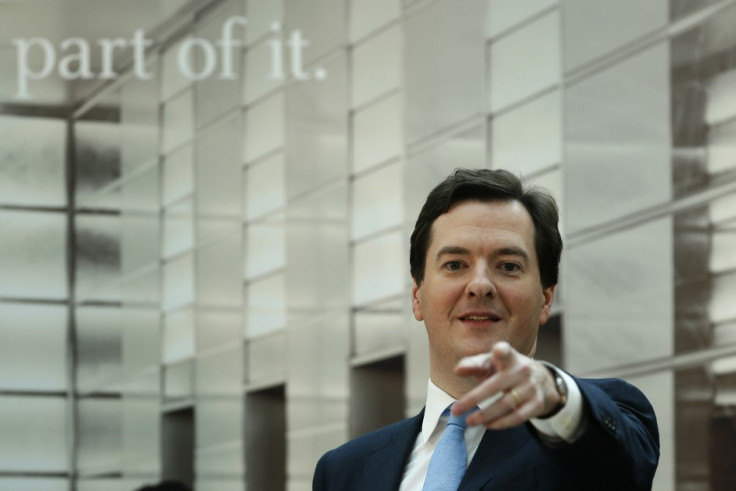Britain Flirts With 'Triple-Dip' Recession After Grisly Manufacturing Data

Britain may have stamped its ticket to triple dip recession after a grisly reading of industrial activity in January points to an even deeper slide for the country's struggling economy.
Industrial production fell 1.2 percent from the previous month, the Office for National Statistics said, while manufacturing activity slid a deeper-than-expected 1.5 percent. Crucially, the ONS said the severe winter snowstorms in the middle of the month were not a major factor in the disappointing figures, suggesting a February rebound is unlikely.
"Overall, a dire set of UK data," said RBS economist Ross Walker. "The slump in industrial production in January leaves a decline in (first quarter) GDP looking more likely than not - at any rate, some combination of upward revisions/rebounds in IP alongside a revival in services output growth will be required to avert a slide back into a technical 'triple-dip recession'"
"Sustainable recovery and macroeconomic rebalancing feel as distant as ever. And it is far from clear that ever more doses of QE or currency depreciation will prove any more effective than in the past," he warned.
The January drop in industrial production was the steepest since June, which itself was hit by the impact of the extra holiday for the Queen's Jubilee celebrations. Removing that caveat and you need to go all the way back to January of 2009 - the teeth of the global financial crisis - to find a grimmer reading for Britain's industrial economy.
Societe Generale economist Herve Armourda, however, noted that two "one-off" factors - maintenance issues in North Sea oil production and the severe January weather - could mean the economy narrowly escapes the so-called "triple-dip".
"As these factors are temporary and set to be reversed," he wrote in a note to clients Tuesday. "Looking ahead, the sharp fall of sterling since the beginning of the year will play some role in helping the manufacturers."
Investors may also find some measure of support from the rebound in Britain's services sector, which makes up around 75 percent of the economy. Last month it grew at the fastest pace since October according to the Markit/CIPS Purchasing Managers' Index and pointed to first quarter GDP growth of around 0.1 percent.
"Growth could turn out stronger than this, as there's good reason to believe that at least some of the weakness in manufacturing and construction was due to business being disrupted by bad weather, meaning a brighter picture may emerge in March," said Markit's chief econnmist, Chris Williamson, when the PMI was released on 5 March.
Benchmark 10-year Gilt yields fell 6 basis points to 1.96 percent after the data release, according to Reuters' data, the lowest in around 10 days and well below the 2.02 percent average over the past three months.
Sterling was also under pressure, falling further from a two and a half year low against the US dollar to change hands at $1.4865. The Bank of England's trade-weighted sterling index fell to a 20-month low of 77.9.
The gloomy data will likey add even more pressure to Chancellor George Osborne as he prepares the most important Budget Statement of his short tenure for 20 March. Political rivals both in and out of his coalition government are clamouring for a change in his "Plan A" strategy of spending cuts and tax increases that he insists are necessary to rebalance the British economy and trim its long-term debts. However, with both economic growth failing to materialize and the government's total borrowing actually set to rise in the current financial year, some business leaders are asking for a slight change intact.
"The Government must stick to its fiscal plan but now is the time to kick-start confidence," said John Cridland, Director General of the Confederation of British Industry lobby group, which outlined £2.2bn in "fiscally neutral" proposals to ignite growth. "Our measures will provide another boost for the housing market and will benefit first-time buyers, those trapped in negative equity and those looking to refurbish their homes."
Britain's economy contracted by 0.3 percent in the final three months of 2012, rounding out a year in which there was only one quarter of economic growth.
Britain's Office for Budget Responsibility, a non-partisan department established by Osborne to assess the government's fiscal policies, said in December that it expects UK GDP to grow by 1.2 percent this year, 2 percent in 2014 and 2.3 percent in 2015.
Two weeks ago, the OBR warned that Britain would need much stronger tax revenue in February and March if it were to meet its borrowing target of £119.9bn for the 2012/13 financial year.
"To meet our autumn forecast would now require much stronger growth in tax receipts in the last two months of the year than we have seen since December or much lower-than-forecast expenditure by central or local government," the OBR said.
The European Commission said in its winter economic forecast in February that it expected Britain's budget deficit to widen to 7 percent of GDP in 2013/14 financial year and saw overall government debt rising to a record 97.1 percent of GDP by the 2014/15 financial year.
The International Monetary Fund downgraded its forecast for UK GDP in February in its world economic outlook and now expects growth of 1 percent this year, and 1.9 percent in 2014.
© Copyright IBTimes 2025. All rights reserved.




















